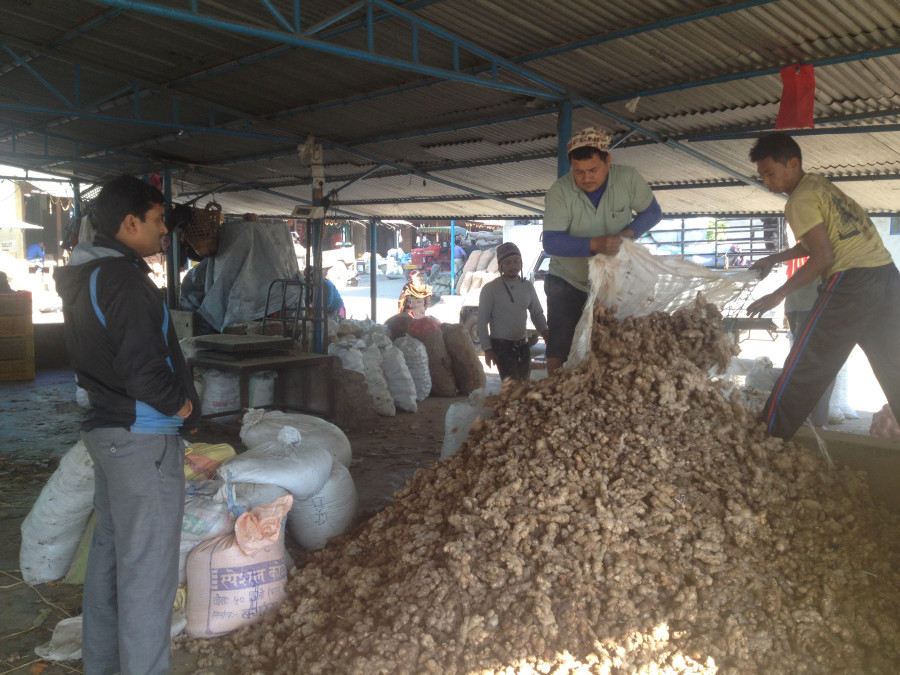Money
As ginger prices plunge in India, Nepali farmers face huge losses
Farmers say the government has taken no initiative to seek alternatives to the Indian market.
Pradeep Menyangbo
Padam Rai, a ginger farmer from Sano Khaireni, Sunsari last year earned Rs800,000 last year selling ginger at Rs120 per kg. But this year his loss totalled Rs700,000.
Rai, a leader among farmers of Sano Khaireni, had planted 160 kgs of ginger on around three bighas (2 hectares) of land as he was hopeful of high returns like last year. Rai worked harder this year to increase ginger production.
The main reason for his loss was the decline in the price of Nepali ginger in the Indian market which went down by about 85 percent.
"Even though I incurred a loss, I sold ginger cheaply, but thousands of farmers like me left ginger in their fields rotting after not being able to reclaim even transportation costs," said Rai.
Even though India has kept exports open, ginger farmers have been told by wholesalers not to bring ginger to the market due to which ginger rotting in the fields, Rai said.
Bishnupaduka of Dharan Sub-metropolitan City, where Sano Khaireni is located, has been named as a major ginger producing zone by the government.
Rai planted 160 kg ginger seeds in three bighas of land investing Rs176,000 and spread manure on it and weeded the fields.
The price of ginger dropped to Rs20 per kg when it was being readied for sale which does not even raise the transportation cost, he said.
"The farmers have to bear the consequences of relying on Indian consumers and market prices for ginger exports," Rai said. "With the government not able to find the alternatives for the Indian market, ginger farmers are worried."
Farmers have no clue how long they will have to face the same problem.
Even though the export of Nepali ginger is open in the Indian market, the wholesale price of ginger is only Rs25 per kg this season, which has led to investment of farmers and traders being wasted . Ginger produced in eastern Nepal could not be exported to India as it did not fetch a reasonable price.
"Wholesalers in the agricultural market are reluctant to buy ginger from farmers due to low prices in the Indian market," said Laxman Bhattarai, manager of the Dharan-based Agricultural Commodity Market.
About 90 percent of the ginger produced in Nepal—in some areas of Sunsari, Morang, the northern part of Udayapur, Khotang, Panchthar, Terhathum and Sindhuli—is exported to the Indian market.
"It is the result of not finding the alternative market to the Indian market for the export of ginger produced in Nepal," said Bhattarai.
Three years ago, when there was a good harvest of the spice, India refused to import ginger saying it needed to be quarantined, but agreed to import only after there were talks between Nepal and India.
According to Bhattarai, when there was a problem in exporting ginger to India, the government showed the dream to farmers of finding alternatives to the Indian market and exporting to third countries by setting up processing centers to make ginger spices, sweeteners, juices, essential oils, candies, other medicines as well as packaging, branding, labelling and marketing.
But this never materialised.
According to the Agricultural Produce Market, ginger has the lowest price and lowest turnover this year of the last four years.
Bhattarai said that 8,542 tonnes of ginger were exported to the Indian market at a wholesale price of Rs80 in 2018-19. When the price increased to Rs120 per kg in the fiscal year 2019-20, the export increased to 10,589 tonnes.
Going by the trend, it was estimated that 11,000 metric tonnes of ginger would be exported from Dharan's Agriculture Commodity Market through Indian traders in the fiscal year 2020-21. However, due to the sudden fall in prices, it is estimated that 6,500 tonnes will be traded this time, said Bhattarai.
According to Bhattarai, the export of ginger last year was worth Rs1.32 billion. However, Nepali ginger farmers have to bear a loss of Rs1.18 billion as compared to last year as only Rs140 million worth of ginger was traded.




 9.7°C Kathmandu
9.7°C Kathmandu















